Trevor Parry-Giles

Associate Dean for Faculty Affairs and Research, College of Arts and Humanities
Professor, Communication
tpg@umd.edu
1102C Francis Scott Key Hall
Get Directions
Education
Ph.D., , Indiana University
Research Expertise
Political Communication
Popular Culture
Rhetoric
Trevor Parry-Giles is the Associate Dean for Faculty Affairs and Research in the College of Arts & Humanities and a Professor in the Department of Communication. Prior to becoming the AD for Faculty Affairs and Research, Dr. Parry-Giles served as ARHU's first Associate Dean for Diversity, Equity, and Inclusion.
Dr. Parry-Giles’s research and teaching focus on the historical and contemporary relationships between rhetoric, politics, law, and popular culture. He is the author or editor of four books, including The Character of Justice: Rhetoric, Law, and Politics in the Supreme Court Confirmation Process and The Prime-Time Presidency: The West Wing and U.S. Nationalism (with Shawn J. Parry-Giles). His research has appeared in the Quarterly Journal of Speech, Rhetoric & Public Affairs, Presidential Studies Quarterly, the Journal of Popular Film and Television, Celebrity Studies, the Journal of Communication, and elsewhere. Dr. Parry-Giles is a Distinguished Research Fellow and a Distinguished Teaching Fellow of the Eastern Communication Association. In 2019, Dr. Parry-Giles received the University of Maryland's Graduate Faculty Mentor of the Year Award.
Dr. Parry-Giles completed the Big 10 Academic Alliance's Academic Leadership Program in 2024 and was named a 2022 HuMetricsHSS Community Fellow, participating in the HuMetrics "Envisioning the Future Academy" program in 2024. He also completed the ADVANCE program's Equity-Coaching Training at UMD in 2023. While working for the National Communication Association in the 2010s, Dr. Parry-Giles was the lead director of the Learning Outcomes in Communication project, funded by Lumina Foundation. He authored several essays about disciplinary learning outcomes tuning, the Communication discipline, and research assessment that appeared in Inside Higher Ed, the Academy Data Forum of the AAAS, The Scholarly Kitchen, and elsewhere.
Dr. Parry-Giles is a frequent commentator about contemporary and historical political communication and has appeared on C-SPAN's Washington Journal, the NBC Nightly News, Maryland Public Television, CCTV, and all the network affiliates in Washington, DC. He is quoted often in political news coverage, including in the Washington Post, the New York Times, Politico, USA Today, the Wall Street Journal, Bon Appetit, and elsewhere. In addition, Parry-Giles has been interviewed by the BBC, Minnesota Public Radio, New Hampshire Public Radio, Utah Public Radio, Wisconsin Public Radio, WAMU (NPR--Washington, DC), and WYPR (NPR--Baltimore, MD), among others. In 2023, Parry-Giles appeared on a panel discussion sponsored by the White House Historical Association and the Kluge Center of the Library of Congress entitled "The White House and Television."
Current research projects: exploring the rhetorical life and times of famed New Mexico law enforcement officer and politician Elfego Baca; examining the screening of the American presidency via popular culture.
Publications
Political Communication
Chapter examines the contemporary state of political communication.
Author/Lead: Trevor Parry-Giles
Book abstract:
This book provides an inside look at the discipline of Communication. In this collection of chapters, top scholars from a wide range of subfields discuss how they have experienced and how they study the crucial issues of our time.
The 2020s opened with a series of events with massive implications for the ways we communicate, from the COVID-19 pandemic, a summer of protests for social justice, and climate change-related natural disasters, to one of the most contentious presidential elections in modern U.S. history. The chapters in this book provide snapshots of many of these issues as seen through the eyes of specialists in the major subfields of Communication, including interpersonal, organizational, strategic, environmental, religious, social justice, risk, sport, health, family, instructional, and political communication. Written in an informal style that blends personal narrative with accessible explanation of basic concepts, the book is ideal for introducing students to the range and practical applications of Communication discipline.
Envisioning a Remembered Future: The Rhetorical Life and Times of The Manchurian Candidate
This article explores the rhetorical life and times of "the Manchurian candidate" in America’s rhetorical/political culture.
Author/Lead: Trevor Parry-GilesNon-ARHU Contributor(s): Timothy Barney
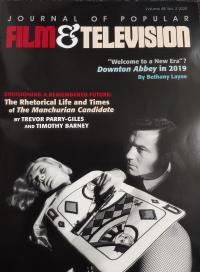
This article explores the rhetorical life and times of "the Manchurian candidate" in America’s rhetorical/political culture. It specifically addresses the lasting capacity of the "Manchurian candidate" to operate as a political trope, a signifier divorced fully from its original signified, yet still filled with meaning and power, particularly for ordering conspiracy rhetorics in contemporary political campaigns as an emblem of the "paranoid style" in American politics. The essay examines the conversion of the "Manchurian candidate" into a political trope, from its initial expression in its Cold War context and the subsequent rearticulations of the "Manchurian candidate" for audiences living in varied non–Cold War contexts. Ultimately, the migration of this narrative and its conversion over time into a political trope for active use in U.S. political discourse is a compelling example of the lasting influence of Cold War culture in the American consciousness as well as the malleability, the flexibility, of Cold War characters, cultural themes, and rhetorics.
Public Address and Moral Judgment: Critical Studies in Ethical Tensions
The essays in Public Address and Moral Judgment consider the powerful role of public discourse in the constitution of a moral code for the American people.
Author/Lead: Shawn J. Parry-Giles, Trevor Parry-GilesAward Organization:
Best Edited Volume Award, Communication Ethics Division, National Communication Association, 2010.
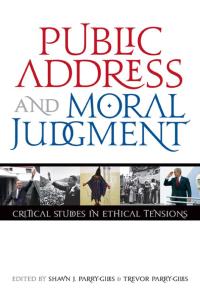
Public Address and Moral Judgment offers a critical look at the ways in which public address can enact moral codes, articulate moral judgments, and manifest ethical tensions. Each chapter carefully examines specific examples of public address for their moral dimensions, exploring how public address functions to articulate and express the ethical tensions of its time and context. The contributors highlight important and often different ways that public address works to expose problematics in ethical tensions—problematics of language and imagery, metaphor and character, genre and definition. The authors are also mindful of the tenuous relationship that exists between rhetoric and morality, between situated public address and a society's ethical foundations.
The essays in Public Address and Moral Judgment, on topics ranging from WWII propaganda to the civil rights rhetoric of President George H. W. Bush to the photographs from the Abu Ghraib prison, consider the powerful role of public discourse in the constitution of a moral code for the American people.
Read More about Public Address and Moral Judgment: Critical Studies in Ethical Tensions
The Character of Justice: Rhetoric, Law, and Politics in the Supreme Court Confirmation Process
The Character of Justice points to the centrality of the Supreme Court confirmation process to the ideological constitution of the American system of democracy and law.
Author/Lead: Trevor Parry-GilesAward Organization:
Kohrs-Campbell Prize in Rhetorical Criticism, 2007
Diamond Anniversary Book Award, National Communication Association, 2007
Marie Hochmuth Nichols Award, Public Address Division, National Communication Association, 2007
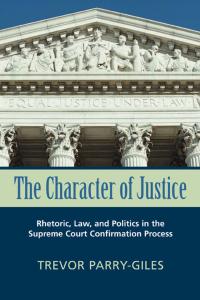
For much of American history, Supreme Court nominations attracted little public attention. The rancorous public hearings that characterize contemporary confirmation struggles were unheard of prior to the twentieth century. Today, except for presidential campaigns, no single constitutional event produces more controversy and interest than the nomination of a Supreme Court Justice. The intense scrutiny of this process is not surprising, as the Court addresses profound issues of civil rights and liberties, constitutional law, and economics policy, and the power of one vote is considerable. As it has done so many times before, regarding Bush v. Gore, the Supreme Court in 2000 inserted itself into a critical and ongoing national debate. Slavery, property rights, abortion, individual privacy, freedom of religion—all of the great issues that have confronted the United States have come before the Supreme Court for resolution. Judicial philosophies, plus ideological formation for American conceptions of law, justice, and democracy are rhetorically important.
Parry-Giles examines some controversial and ideologically meaningful Supreme Court nominations from 1916 through 1987: Louis D. Brandeis, Charles Evans Hughes, John J. Parker, Thurgood Marshall, Clement F. Haynsworth Jr., G. Harrold Carswell, and Robert Bork. The book also discusses recent confirmations, including Clarence Thomas, Ruth Bader Ginsburg, and Stephen Breyer. The Character of Justice points to the centrality of this process to and the ideological constitution of the American system of democracy and law.
The Prime-Time Presidency: The West Wing and U.S. Nationalism
The Prime-time Presidency presents a detailed critique of The West Wing rooted in presidential history, an appreciation of television's power as a source of political meaning, and television's contribution to the articulation of U.S. national identity.
Author/Lead: Trevor Parry-Giles, Shawn J. Parry-Giles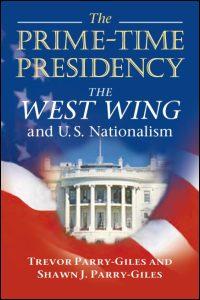
Contrasting strong women and multiculturalism with portrayals of a heroic white male leading the nation into battle, The Prime-Time Presidency explores the NBC drama The West Wing, paying particular attention to its role in promoting cultural meaning about the presidency and U.S. nationalism. Based in a careful, detailed analysis of the "first term" of The West Wing's President Josiah Bartlet, this criticism highlights the ways the text negotiates powerful tensions and complex ambiguities at the base of U.S. national identity--particularly the role of gender, race, and militarism in the construction of U.S. nationalism. Unlike scattered and disparate collections of essays, Trevor Parry-Giles and Shawn J. Parry-Giles offer a sustained, ideologically driven criticism of The West Wing. The Prime-time Presidency presents a detailed critique of the program rooted in presidential history, an appreciation of television's power as a source of political meaning, and television's contribution to the articulation of U.S. national identity.
Read More about The Prime-Time Presidency: The West Wing and U.S. Nationalism
Constructing Clinton: Hyperreality and Presidential Image-Making in Postmodern Politics
Constructing Clinton focuses on the image of Bill Clinton as it was defined by and trapped in the hyperreality so characteristic of contemporary presidential politics.
Author/Lead: Shawn J. Parry-Giles, Trevor Parry-GilesAward Organization:
Everett Lee Hunt Award for Outstanding Scholarship, Eastern Communication Association, 2003.
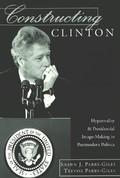
Bill Clinton is the embodiment and epitome of American politics in the postmodern, mediated age. Clinton’s able marshaling of images, which allowed him to retain popularity and position when faced with compelling obstacles, marks him as the preeminent figure in a fluid and fluctuating era of image-politics. Constructing Clinton: Hyperreality & Presidential Image-Making in Postmodern Politics pays particular attention to the collection of disparate, sometimes connected, often random images that create a site of political meaning we know as «Bill Clinton, former president of the United States.» Through analyses of unique image texts – including The Man from Hope, The War Room, Primary Colors, MTV’s Biorhythms, and PBS’ The American President – Constructing Clinton focuses on the image of Bill Clinton as it was defined by and trapped in the hyperreality so characteristic of contemporary presidential politics.

